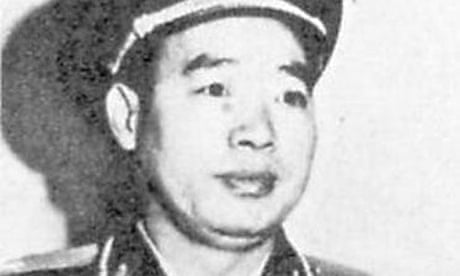When Mao Zedong’s bodyguard, Wang Dongxing, who has died aged 99, joined the plot to arrest Mao’s wife, Jiang Qing, and her associates in the “Gang of Four” after Mao’s death in China in 1976, he knew it was a high-risk affair. Assembling a group of special forces officers under his command, he made them swear an oath of loyalty and secrecy. He also instructed them to shoot to kill if there was any armed resistance.
In the event no blood was shed: Jiang’s three close associates were lured to a high-level meeting ostensibly to discuss the building of Mao’s mausoleum and the publication of his latest works. They were quickly nabbed when they entered a building in the Zhongnanhai leadership compound next to the Forbidden City, and Jiang was seized separately.
Wang’s risky move had paid off, and he then fully supported Hua Guofeng, China’s new leader, who claimed to have inherited Mao’s mantle. But Wang was not so politically astute during the next two years, during which the supporters of Deng Xiaoping – out of favour before Mao’s death – were rallying to bring Deng back to power. “Deng has some capability,” Wang said scornfully, “but his mistakes are far greater.”
The mistake was Wang’s: as Mao had once said, Wang was very capable, but he was not very bright politically. In late 1978 Deng gained effective control of China and began to launch reform policies that reversed those of Mao’s Cultural Revolution (1966-76). At the Communist party plenum that signalled Deng’s return, Wang lost control of the critically important central security bureau, which had hitherto placed him at the centre of the political elite. Thereafter, along with Hua and other leaders who still believed that Mao’s road to socialism was essentially right, Wang passed into political oblivion. Like them, he lived comfortably thereafter, and even wrote some memoirs, but spent the remaining decades of his life in the twilight.
Wang was born in the southern province of Jiangxi and came from a poor peasant family. In his teens he joined the communist Red Army, which was then based in the province, and followed them on the Long March (1935-36) to Yan’an, their new revolutionary base in north-west China. After the war with Japan ended and civil war broke out in China between Chiang Kai-shek’s nationalists and the communists, Wang was attached to the special bodyguard unit around Mao.
In 1947, when Chiang’s forces threatened Yan’an and the communist army retreated, Mao at first wished to stay in the rearguard, but Wang volunteered instead. “If the chairman orders me”, he declared, “ I shall wait here for the enemy.” His loyalty was rewarded after the communist victory in 1949, when he not only gained a leading job in the security apparatus but took a post in the party’s central secretariat.
From then on Wang occupied a key position close to the top leadership – particularly Mao – and was fully involved in the Communist party’s internal affairs. He was largely an unseen figure, but in 1966 he could be spotted in the great Red Guard rallies at the start of the Cultural Revolution, sitting proudly next to the chauffeur in the open-top car from which Mao reviewed his fervent supporters. After Mao’s death, Wang remained a constant supporter, always visiting the mausoleum in Tiananmen Square with flowers on Mao’s birthday. He also published a diary to commemorate the 100th anniversary of Mao’s birth.
As head of Mao’s personal security for many years, Wang had been privy to many secrets, including the leader’s extra-marital affairs. Jiang had many times been humiliated by having to ask Wang what her husband was doing – a request Wang often refused to answer. After Mao’s death Wang knew very well that Jiang would settle scores with him if she and her ultra-left colleagues increased their power in the leadership vacuum. He blocked her attempt to gain control of Mao’s personal archives, which she might then have used to claim that Mao backed her authority, and when in early October 1976 he was sounded out by Ye Jianying, the veteran military leader, about the idea of arresting the Gang of Four, Wang made up his mind quickly. “Events are pressing,” he told Ye. “We can delay no longer.”
Little was heard from Wang in his later days as he lived out his time in obscurity. But in 2011 he reportedly complained that Chinese socialism was in retreat, and that everyone was now “fixated on getting money”. No contemporary Chinese political leader would have dared talk like that, but Wang remained wedded to his early beliefs, declaring himself “a loyal soldier of chairman Mao” to the end.

Comments (…)
Sign in or create your Guardian account to join the discussion